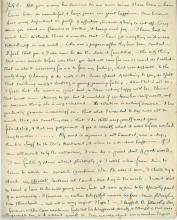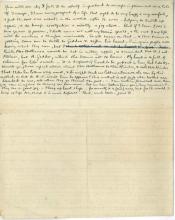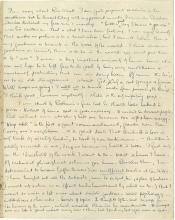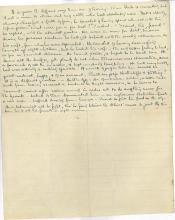BRACERS Record Detail for 18679
To access the original letter, email the Russell Archives.
"July 2. All your many kindnesses to me ever since I have been in here have been so wonderful, and have given me great happiness."
Letter 31
BR TO OTTOLINE MORRELL, 2 JULY [1918]
BRACERS 18679. ALS. Texas
Previous Brixton letter, BRACERS 46922; next letter, BRACERS 48710
Edited by K. Blackwell, A. Bone, N. Griffin and S. Turcon
<Brixton Prison>1
July 2.
All your many kindnesses to me ever since I have been in here have been so wonderful, and have given me great happiness. One becomes here very dependent on proofs of affection, because of being so cut off. Every time you send me flowers or books, it brings real joy. — I have had so much time to think these 2 months that I have got everything as it were tidied up in my mind — like one’s papers after they have been sorted. I feel that you and I can now be in the closest friendship, — the only thing that was amiss before was that you did not care for me as much as I wished — that made it necessary for me to free my feelings, which was difficult. In the early days of having to do with C.M.2 I was afraid of talking to you, as I felt that talking might destroy a young growing feeling. Now that is not so. I feel that she cares a great deal, and I am entirely happy with her. I know that must seem strange to you, but it wouldn’t if you knew her really well, only in serious things she is very reserved. The relation is entirely serious — it has gradually grown increasingly so. But what I wanted to say was not so much that, as something else: that I do still very greatly want your friendship, and that my judgment of you is exactly what it was before we had any troubles. …
My minda is vigorous and not haunted, now-a-days, thanks chiefly to the Dr’s treatment,3 and also to instinctive happiness. If I am allowed to by the authorities, I can do a great deal of good work. I am full of ideas about philosophy, and I wish also from time to time to write on social questions. When the war is over, I shall try to start unofficial lectures at Camb. one day in the week. I want still to teach and have to do with young men, but not ever again to be officially part of a university.4 I foresee a rather delightful career as free-lance philosopher, like Abailard — but not in every respect5 I hope! — I dropped the fellowship idea, because Wildon Carr made me feel that he disapproved strongly, and I thought in that case others would too, and it wasn’t worth it. I can manage about money somehow I suppose. You will see why I feel it so vitally important to escape imprisonment as a C.O.6 If I escape, I have every prospect of a life that ought to be very happy and very useful, and just the sort one wants in the world after the war — helping to build up again, and to keep civilization and vitality and joy alive. But if I have (say) two years of prison, I shall come out with my brain spoilt, and the rest of my life will be useless and therefore miserable. So all turns on that — and that turns on getting some one to talk to Geddes7 and soften his heart. I imagine people are doing what they can, but I think Mrs Hobhouseb could be set in motion again, and reminded that it is not Milner,8 but A. Geddes, which she seems not to know. My head is so full of schemes for life and work — it is desperately hard to be patient in here, but I do try. Would you please repeat above about Mrs Hobhouse to Miss Rinder, and tell Miss Rinder that I like her letters9 very much, and she might send me letters whenever she can by this method,10 so that the H.O.11 won’t have to approve! This method is only safe when books are handed to me, not when they go through the post. — I am looking forward more than you can imagine to seeing you tomorrow. Let me have letters from you when convenient — they are a great joy. — I keep up heart and hope — for oneself it is fairly easy, but for the world I keep up hope too, though it is more difficult. Much, much love.
Your
B.
I am sorry about Rimbaud.12 I am quite prepared to believe in his excellence but he doesn’t belong with my present mood. I remember Theodore Davies disliked my “Free Man’s Worship”13, c — “better just say Damn and go on” was his criticism. That is what I have been feeling. I can enjoy beauty that makes no pretence to be a revelation, but I cannot believe there is any goodness or beauty in the core of the world. I think whatever goodness or beauty there is to be in the world we must put there — and by “we” I mean a tiny impotent minority of human beings, who can only hope to be left free to do good by being very unobtrusive and constantly pretending that we are doing harm.14 (Of course this brings us to an old disagreement — about God.) Only a sort of rage and fierce Will keeps me going: I will not be turned aside from pursuing the things I think good, however impotently. Pride is the only unfailing prop.
I was struck by Bakunin’s fear lest he should lose hatred in prison.15 Hatred of some sort is quite necessary — it needn’t be towards people. But without some admixture of hate one becomes too soft and loses energy. “Keep vital” is the first and great commandment, greater even than loving one’s neighbour — and a great deal that thinks it is love is only lack of vitality leading to lack of combativeness. — Ambition is oddly revived in me, I suppose because my health is better. I feel only on the threshold of the work I want to do — vast schemes I have. My technical philosophical schemes you know. Besides them, I am determined to become (after the war) an unofficial teacher at Cambridge. I have thought out all the details, even to subject, time, and place of lectures. (I would not return as an official teacher however much they asked me to.)d And I want to write a lot more about social questions — social psychology — institutions and character — hosts of topics. In thoughts of this sort I escape from the horror of the war, which would otherwise be unendurable. It sweeps over me like a great wave every now and then, but I find my feet again sooner or later.
It is queer the different ways there are of living. To me Pride is essential, but I had a man to clean out my cell16 who had absolutely none. Fat and elderly, always cheerful and full of fun, he boasted of having spent almost all his life in prison. “What were you in for last?” I asked. “Fraud, Sir, fraud” he replied, with the utmost gusto. He was in now for debt, because during his previous sentence he had got behind with the weekly allowance to his wife, from whom he was separated. He boasted of having successfully brought up eight children, but he hated his wife — the only bitter feeling he had, as far as I could discover. He loved prison, and hoped to be back soon. He knew all the dodges, got plenty to eat when others were near starvation, was a favourite of all the warders, and kept everybody laughing. He had many merits, but was utterly and entirely ignoble. A world of people like him would be good-natured, happy, and of no account. Shall we prefer Northcliffe and Billing?17 It is a difficult question. — Another type: An Australian soldier, a little late back from leave,18 received a sentence he thought excessive, so he swore to commit crime after crime merely in order not to do anything more for the tyrants — hatred of them dominated him — an inglorious Achilles.19 Quite a nice man — suffered terribly from hunger — I used to give him food on the sly. He is determined not to fight, though he firmly believes the Allies’ cause is just. By this time he is at his fourth or fifth crime.
- 1
[document] The letter was edited from a digital scan of BR’s initialled, handwritten original in the Morrell papers at the University of Texas at Austin. The sheet beginning “I am sorry about Rimbaud” was scanned with Letter 61, to which it manifestly did not belong. Instead, because of the continued discussion of Rimbaud’s merits, it surely belongs soon after Ottoline’s concluding mention of Rimbaud in her letter of 1 July 1918 (BRACERS 114748). BR had told her in a Letter 27 message that Rimbaud “means nothing to me”. The undated additional sheet may well have been written after Ottoline’s visit on 3 July.
- 2
early days of having to do with C.M.Ottoline expressed her shock at learning Colette had been BR’s mistress for nearly a year, in R. Gathorne-Hardy, ed., Ottoline at Garsington: Memoirs of Lady Ottoline Morrell, 1915–1918 (London: Faber and Faber, 1974, p. 178; see also p. 147). At the time she disguised her feelings and told BR she was glad for him (p. 178).
- 3
Dr’s treatment “For piles”.(BR’s note at BRACERS 119458.) The doctor was Elizabeth’s brother Sidney Beauchamp (1861–1921), M.B., B.Ch., physician. He became resident medical officer with the British delegation at the Paris Peace Conference in 1919. He was killed in a motor-bus accident.
- 4
unofficial lectures at Camb. ... not ever officially part of a university Since being deprived of his lectureship in logic and the principles of mathematics by the Trinity College Council in July 1916, BR’s only realistic prospect of philosophical lecturing at Cambridge was on such ad hoc terms. He did not satisfy this ambition, but had already delivered two notable series of “unofficial” lectures in London(on philosophy of mathematics, from which his Introduction to Mathematical Philosophy emerged in prison, and “The Philosophy of Logical Atomism”). From May to June 1919 he presented a third series (“The Analysis of Mind”) at the same venue, Dr. Williams’ Library in Bloomsbury. Later in the year and in 1920 the series was doubled in length and given twice, at Dr. Williams’ Library and Morley College. Six months later BR’s Trinity College lectureship was restored, but almost his first action on accepting this five-year reappointment was to request a year’s leave of absence. In January 1921, while teaching in China, he tendered his resignation before ever becoming “officially part” of the university again (G.H. Hardy, Bertrand Russell and Trinity [Cambridge: Cambridge U. P., 1942, 1970], p. 57).
- 5
free-lance philosopher, like Abailard ...not in every respect The medieval philosopher Peter Abelard (c.1079–1142) was no conventional monastic scholar but lectured widely on both theology and logic — which repeatedly brought him into conflict with the Church. Yet BR was surely referring to the castration of Abelard by henchmen of the uncle of Héloïse, the lover whom he had secretly married, rather than to the heresy charges he faced later in life.
- 6
imprisonment as a C.O. BR was hinting at the possibility of prolonged detention in military or civil custody, should he be called up for military service after his release from Brixton, have his claim for absolute exemption rejected, and then refuse to undertake “alternative” war work. In April 1918 the upper-age limit for British conscripts had been raised from 40 to 50 (see Letter 6).
- 7
some one to talk to Geddes I.e., about the fellowship plan.
- 8
Mrs Hobhouse ... in motion again ... not Milner Margaret Hobhouse (1854–1921) was the mother of Stephen Hobhouse, a Quaker pacifist who in April 1917 had been sentenced to two years’ hard labour after being denied an absolute exemption from military service. But she was also the wife of a former Liberal Unionist M.P., while her son’s godfather was Alfred, Viscount Milner (1854–1925), the former colonial administrator and an influential member of Lloyd George’s War Cabinet. Although contemptuous of dissent and a “social-imperialist” who even favoured peacetime conscription, Milner was sympathetic to the plight of Hobhouse and other such religious C.O.s, whom he judged sincere and as neither “shirkers” nor “agitators”. At the prompting of Mrs. Hobhouse, Milner interceded discreetly on his godson’s behalf. Meanwhile, BR abetted the public campaign by secretly ghostwriting a letter (“Conscientious Objectors” [1917]) (Letter 12 was recently revised) to the New Statesman for Mrs. Hobhouse as well as a chapter of her book, ‘I Appeal unto Caesar’ (42 and 52 in Papers 14). In a notable political triumph for the C.O. movement, some 300 imprisoned “absolutists” were released before the year’s end. On 8 July 1918 Ottoline reported to BR that Rinder was planning to see Mrs. Hobhouse. Notwithstanding BR’s instruction, however, Ottoline insisted that Milner was the more influential contact: “Geddes would have to obey him and of course he is much more approachable than G. who is quite unhuman everyone says” (BRACERS 114749).
- 9
tell Miss Rinder that I like her letters Three of her letters survive from June 1918 (BRACERS 79614, 116585 and 79616).
- 10
by this method By smuggling letters into prison inside books and journals.
- 11
H.O. The Home Office, which was ultimately responsible for prison governance, although most administrative duties fell inside the remit of the Prison Commission, a statutory board created in 1877.
- 12
sorry about Rimbaud BR had already told Ottoline, also apologetically, in a message communicated to her by Frank, that the French symbolist poet Arthur Rimbaud (1854–1891) “means nothing to me” (Letter 27).
- 13
I remember Theodore Davies disliked my “Free Man’s Worship” BR was probably recalling a conversation with the late Theodore Llewelyn Davies (1871–1905), a close Cambridge friend who became a Treasury official. A journal (1 in Papers 12) kept by BR when he wrote his much-anthologized essay, “The Free Man’s Worship” (1903; 4 in ibid.), shows that he was in regular contact with both Theodore and his brother Crompton, who shared a Westminster home.
- 14
pretending that we are doing harm BR meant “harm” in the eyes of the minority, not from the point of view of the authorities (see Letter 18), with whom the minority pretended to cooperate.
- 15
Bakunin’s fear lest he should lose hatred in prison Russian anarchist Mikhail Bakunin (1814–1876) was first imprisoned in Saxony, where he was captured after leading the failed Dresden uprising of 1849. He was transferred into Austrian custody for a time before being incarcerated in Russia for six years. Although he suffered terribly, Bakunin “feared one thing above all”, according to James Guillaume, the French anthologizer of his writings whom BR quotes in the anarchism chapter of Roads to Freedom (London: Allen & Unwin, 1918), pp. 43–4: “He feared that he might cease to hate, that he might feel the sentiment of revolt which upheld him becoming extinguished in his heart, that he might come to pardon his persecutors and resign himself to his fate. But this fear was superfluous; his energy did not abandon him a single day, and he emerged from his cell the same man as when he entered.” The truth may have been more nuanced. While in St. Petersburg’s notorious Peter and Paul Fortress, Bakunin was ordered by Tsar Nicholas I to write a confession — a curious statement that remained unpublished until 1921, in which he justified his revolutionary past but also pleaded for clemency and blatantly appealed to the Tsar’s pan-Slavic chauvinism.
- 16
man to clean out my cell He is discussed in “Are Criminals Worse than Other People?” (1931; Mortals and Others [London: Routledge, 2009], p. 30).
- 17
Shall we prefer Northcliffe and Billing? In light of the ethical quandary posed by BR, it is worth noting that, in an earlier message to Ottoline, he had characterized Northcliffe as “sincere but evil” (Letter 7). Noel Pemberton Billing, aviator, Independent M.P. for East Hertfordshire (since March 1916), and publisher of The Imperialist, was another notorious Germanophobe. His flair for self-promotion had recently been demonstrated by his successful defence of a libel suit brought by a dancer in connection with Billing’s homophobic conspiracy theory — namely, that British public life was thoroughly debauched and that thousands of individuals were susceptible to blackmail by German spies.
- 18
Australian soldier, a little late back from leave He is also discussed in “Are Criminals Worse than Other People?”, Mortals and Others, pp. 29–30.
- 19
inglorious Achilles This mention of the renowned warrior from Greek mythology reminds one of the phrase “some mute inglorious Milton” from Thomas Gray’s “Elegy Written in a Country Churchyard” (from which BR had used the first line, “The curfew tolls the knell of parting day”, as a propositional example in “On Denoting” [Papers 4: 421]).
Textual Notes
- a
My mind Preceded by a dash and five dots, which are taken, in the context of keeping to one smuggled sheet, as a paragraph break.
- b
think Mrs Hobhouse after deleted think Whitehead could be hurried a little.
- c
“Free Man’s Worship” Capitals and quotation marks were supplied editorially.
- d
(Of course this brings … God.) … (I would … me to.) The parentheses appear to be BR’s in the original; but in certain other letters they were supplied by Ottoline for her personal typescript of BR’s letters.




